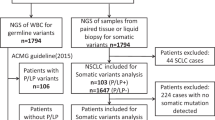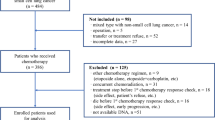Abstract
ABCG2, CD133 and CD117 are pivotal markers of cancer stem cell, which are involved in carcinogenesis and cancer progression. The expression of these genes has been reported to be associated with the development and progression of many cancers, including non-small cell lung cancer (NSCLC). We selected and genotyped 9 potentially functional single-nucleotide polymorphisms in the 3 genes in a clinical cohort of 1001 NSCLC patients in a Chinese population. We found that variant genotypes of ABCG2 rs3114020 were associated with a significantly increased risk of death for NSCLC (additive model: adjusted hazard ratio=1.25, 95% confidence intervals=1.10–1.42, P<0.001). Further stepwise regression analysis suggested that rs3114020 was an independent risk factor for the prognosis of NSCLC. Besides, histology interacted with the genetic effect of rs3114020 in relation to NSCLC survival in the interaction analysis. Our findings show that ABCG2 rs3114020 might be one of the candidate biomarkers for NSCLC survival in this Chinese population, especially among patients with adenocarcinoma.
This is a preview of subscription content, access via your institution
Access options
Subscribe to this journal
Receive 6 print issues and online access
$259.00 per year
only $43.17 per issue
Buy this article
- Purchase on Springer Link
- Instant access to full article PDF
Prices may be subject to local taxes which are calculated during checkout

Similar content being viewed by others
References
Jemal A, Bray F, Center MM, Ferlay J, Ward E, Forman D . Global cancer statistics. CA Cancer J Clin 2011; 61: 69–90.
Gandara D, Narayan S, Lara PN Jr, Goldberg Z, Davies A, Lau DH et al. Integration of novel therapeutics into combined modality therapy of locally advanced non-small cell lung cancer. Clin Cancer Res 2005; 11: 5057s–5062s.
Yin M, Liao Z, Huang YJ, Liu Z, Yuan X, Gomez D et al. Polymorphisms of homologous recombination genes and clinical outcomes of non-small cell lung cancer patients treated with definitive radiotherapy. PLoS One 2011; 6: e20055.
Rosell R, Cecere F, Santarpia M, Reguart N, Taron M . Predicting the outcome of chemotherapy for lung cancer. Curr Opin Pharmacol 2006; 6: 323–331.
Zeppernick F, Ahmadi R, Campos B, Dictus C, Helmke BM, Becker N et al. Stem cell marker CD133 affects clinical outcome in glioma patients. Clin Cancer Res 2008; 14: 123–129.
Horst D, Kriegl L, Engel J, Kirchner T, Jung A . CD133 expression is an independent prognostic marker for low survival in colorectal cancer. Br J Cancer 2008; 99: 1285–1289.
Singh SK, Clarke ID, Terasaki M, Bonn VE, Hawkins C, Squire J et al. Identification of a cancer stem cell in human brain tumors. Cancer Res 2003; 63: 5821–5828.
Ricci-Vitiani L, Lombardi DG, Pilozzi E, Biffoni M, Todaro M, Peschle C et al. Identification and expansion of human colon-cancer-initiating cells. Nature 2007; 445: 111–115.
Curley MD, Therrien VA, Cummings CL, Sergent PA, Koulouris CR, Friel AM et al. CD133 expression defines a tumor initiating cell population in primary human ovarian cancer. Stem Cells 2009; 27: 2875–2883.
Hu N, Wang C, Ng D, Clifford R, Yang HH, Tang ZZ et al. Genomic characterization of esophageal squamous cell carcinoma from a high-risk population in China. Cancer Res 2009; 69: 5908–5917.
Feng BJ, Huang W, Shugart YY, Lee MK, Zhang F, Xia JC et al. Genome-wide scan for familial nasopharyngeal carcinoma reveals evidence of linkage to chromosome 4. Nat Genet 2002; 31: 395–399.
Petersen S, Aninat-Meyer M, Schluns K, Gellert K, Dietel M, Petersen I . Chromosomal alterations in the clonal evolution to the metastatic stage of squamous cell carcinomas of the lung. Br J Cancer 2000; 82: 65–73.
Bertolini G, Roz L, Perego P, Tortoreto M, Fontanella E, Gatti L et al. Highly tumorigenic lung cancer CD133+ cells display stem-like features and are spared by cisplatin treatment. Proc Natl Acad Sci USA 2009; 106: 16281–16286.
Moreira AL, Gonen M, Rekhtman N, Downey RJ . Progenitor stem cell marker expression by pulmonary carcinomas. Mod Pathol 2010; 23: 889–895.
Ho MM, Ng AV, Lam S, Hung JY . Side population in human lung cancer cell lines and tumors is enriched with stem-like cancer cells. Cancer Res 2007; 67: 4827–4833.
Levina V, Marrangoni AM, DeMarco R, Gorelik E, Lokshin AE . Drug-selected human lung cancer stem cells: cytokine network, tumorigenic and metastatic properties. PLoS One 2008; 3: e3077.
Verzijl A, Heide R, Oranje AP, van Schaik RH . C-kit Asp-816-Val mutation analysis in patients with mastocytosis. Dermatology 2007; 214: 15–20.
Corless CL, Fletcher JA, Heinrich MC . Biology of gastrointestinal stromal tumors. J Clin Oncol 2004; 22: 3813–3825.
Reilly JT . Class III receptor tyrosine kinases: role in leukaemogenesis. Br J Haematol 2002; 116: 744–757.
Ramos AH, Dutt A, Mermel C, Perner S, Cho J, Lafargue CJ et al. Amplification of chromosomal segment 4q12 in non-small cell lung cancer. Cancer Biol Ther 2009; 8: 2042–2050.
Scheffer GL, Pijnenborg AC, Smit EF, Muller M, Postma DS, Timens W et al. Multidrug resistance related molecules in human and murine lung. J Clin Pathol 2002; 55: 332–339.
Yoh K, Ishii G, Yokose T, Minegishi Y, Tsuta K, Goto K et al. Breast cancer resistance protein impacts clinical outcome in platinum-based chemotherapy for advanced non-small cell lung cancer. Clin Cancer Res 2004; 10: 1691–1697.
Imai Y, Nakane M, Kage K, Tsukahara S, Ishikawa E, Tsuruo T et al. C421A polymorphism in the human breast cancer resistance protein gene is associated with low expression of Q141K protein and low-level drug resistance. Mol Cancer Ther 2002; 1: 611–616.
Yanase K, Tsukahara S, Mitsuhashi J, Sugimoto Y . Functional SNPs of the breast cancer resistance protein-therapeutic effects and inhibitor development. Cancer Lett 2006; 234: 73–80.
Muller PJ, Dally H, Klappenecker CN, Edler L, Jager B, Gerst M et al. Polymorphisms in ABCG2, ABCC3 and CNT1 genes and their possible impact on chemotherapy outcome of lung cancer patients. Int J Cancer 2009; 124: 1669–1674.
Salnikov AV, Gladkich J, Moldenhauer G, Volm M, Mattern J, Herr I . CD133 is indicative for a resistance phenotype but does not represent a prognostic marker for survival of non-small cell lung cancer patients. Int J Cancer 2010; 126: 950–958.
Herpel E, Jensen K, Muley T, Warth A, Schnabel PA, Meister M et al. The cancer stem cell antigens CD133, BCRP1/ABCG2 and CD117/c-KIT are not associated with prognosis in resected early-stage non-small cell lung cancer. Anticancer Res 2011; 31: 4491–4500.
Gottschling S, Jensen K, Herth FJ, Thomas M, Schnabel PA, Herpel E . Lack of prognostic significance of neuroendocrine differentiation and stem cell antigen co-expression in resected early-stage non-small cell lung cancer. Anticancer Res 2013; 33: 981–990.
Li F, Zeng H, Ying K . The combination of stem cell markers CD133 and ABCG2 predicts relapse in stage I non-small cell lung carcinomas. Med Oncol 2011; 28: 1458–1462.
Hu Z, Chen J, Tian T, Zhou X, Gu H, Xu L et al. Genetic variants of miRNA sequences and non-small cell lung cancer survival. J Clin Invest 2008; 118: 2600–2608.
Jin G, Miao R, Hu Z, Xu L, Huang X, Chen Y et al. Putative functional polymorphisms of MMP9 predict survival of NSCLC in a Chinese population. Int J Cancer 2009; 124: 2172–2178.
Xu Z, Taylor JA . SNPinfo: integrating GWAS and candidate gene information into functional SNP selection for genetic association studies. Nucleic Acids Res 2009; 37: W600–W605.
Krishnamurthy P, Schuetz JD . Role of ABCG2/BCRP in biology and medicine. Annu Rev Pharmacol Toxicol 2006; 46: 381–410.
Maliepaard M, van Gastelen MA, Tohgo A, Hausheer FH, van Waardenburg RC, de Jong LA et al. Circumvention of breast cancer resistance protein (BCRP)-mediated resistance to camptothecins in vitro using non-substrate drugs or the BCRP inhibitor GF120918. Clin Cancer Res 2001; 7: 935–941.
Mao Q, Unadkat JD . Role of the breast cancer resistance protein (ABCG2) in drug transport. AAPS J 2005; 7: E118–E133.
Sarkadi B, Ozvegy-Laczka C, Nemet K, Varadi A . ABCG2 — a transporter for all seasons. FEBS Lett 2004; 567: 116–120.
Zhou S, Schuetz JD, Bunting KD, Colapietro AM, Sampath J, Morris JJ et al. The ABC transporter Bcrp1/ABCG2 is expressed in a wide variety of stem cells and is a molecular determinant of the side-population phenotype. Nat Med 2001; 7: 1028–1034.
Chen YC, Hsu HS, Chen YW, Tsai TH, How CK, Wang CY et al. Oct-4 expression maintained cancer stem-like properties in lung cancer-derived CD133-positive cells. PLoS One 2008; 3: e2637.
Wang F, Liang YJ, Wu XP, Chen LM, To KK, Dai CL et al. Prognostic value of the multidrug resistance transporter ABCG2 gene polymorphisms in Chinese patients with de novo acute leukaemia. Eur J Cancer 2011; 47: 1990–1999.
Campa D, Butterbach K, Slager SL, Skibola CF, de Sanjose S, Benavente Y et al. A comprehensive study of polymorphisms in the ABCB1, ABCC2, ABCG2, NR1I2 genes and lymphoma risk. Int J Cancer 2012; 131: 803–812.
Poonkuzhali B, Lamba J, Strom S, Sparreboom A, Thummel K, Watkins P et al. Association of breast cancer resistance protein/ABCG2 phenotypes and novel promoter and intron 1 single nucleotide polymorphisms. Drug Metab Dispos 2008; 36: 780–795.
Cheng M, Yang L, Yang R, Yang X, Deng J, Yu B et al. A microRNA-135a/b binding polymorphism in CD133 confers decreased risk and favorable prognosis of lung cancer in Chinese by reducing CD133 expression. Carcinogenesis 2013; 34: 2292–2299.
Pohl A, El-Khoueiry A, Yang D, Zhang W, Lurje G, Ning Y et al. Pharmacogenetic profiling of CD133 is associated with response rate (RR) and progression-free survival (PFS) in patients with metastatic colorectal cancer (mCRC), treated with bevacizumab-based chemotherapy. Pharmacogenomics J 2013; 13: 173–180.
Wang Q, Liu H, Xiong H, Liu Z, Wang LE, Qian J et al. Polymorphisms at the microRNA binding-site of the stem cell marker gene CD133 modify susceptibility to and survival of gastric cancer. Mol Carcinog 2013; 54: 449–458.
Acknowledgements
This work is funded by the National Natural Science Foundation of China (81270044 and 81230067), National Outstanding Youth Science Foundation of China (81225020), Science Foundation for Distinguished Young Scholars of Jiangsu (BK2012042), New Century Excellent Talents in University (NCET-10-0178), Changjiang Scholars and Innovative Research Team in University (IRT0631), The Young Talents Support Program from the Organization Department of the CPC Central Committee, Jiangsu Province Clinical Science and Technology Projects (BL2012008) and Priority Academic Program Development of Jiangsu Higher Education Institutions (Public Health and Preventive Medicine).
Author information
Authors and Affiliations
Corresponding authors
Ethics declarations
Competing interests
The authors declare no conflict of interest.
PowerPoint slides
Rights and permissions
About this article
Cite this article
Sun, J., Zhu, M., Shen, W. et al. A potentially functional polymorphism in ABCG2 predicts clinical outcome of non-small cell lung cancer in a Chinese population. Pharmacogenomics J 17, 280–285 (2017). https://doi.org/10.1038/tpj.2016.2
Received:
Revised:
Accepted:
Published:
Issue Date:
DOI: https://doi.org/10.1038/tpj.2016.2
This article is cited by
-
ABC transporter superfamily. An updated overview, relevance in cancer multidrug resistance and perspectives with personalized medicine
Molecular Biology Reports (2021)
-
High frequency of CYP2D6 ultrarapid metabolizers in Spain: controversy about their misclassification in worldwide population studies
The Pharmacogenomics Journal (2016)



